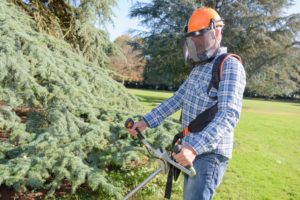SPRING CLEANUP AND EYE PROTECTION
It’s grass mowing, yard cleanup time of year. The leaves are out, flower beds are starting to show their color and you’re getting ready for summer entertaining. It’s important to be proactive about eye protection as you mow, trim, use weed whackers and hedge trimmers. The speed involved while using machinery can cause the unpredictable trajectory of clippings and debris.
While many people routinely don gardening gloves, sun hats, and mud boots, the eyes are often left exposed to everything from prickly branches to flinging rocks. All those powerful yard tools are great at cutting grass and leaves – but they’re also great at kicking up dirt, stones, dust, wood chips, and more. Your eyelids and eyelashes help keep some of the debris and dust out. Unfortunately, we see it all too often and it’s all too easy for something small to fly up and hit your eye when you least expect it!
Safety glasses provide a solid barrier to keep those flying stones and little bits of wood from striking your eye. They’re designed to cover more area around the eye including around the sides if you use a wrap-around style. Better than ordinary glasses, this type of safety glasses help minimize the possibility of something slipping under or around them.
Injuries from these flying objects run from small but painful scratches on the cornea to bits of dirt or wood actually getting stuck in your eye. As you can imagine, not only is this painful, it could impair your eyesight. The foreign objects have to be removed and your eye treated to prevent infections and repair damage.
The American Academy of Ophthalmology offers the following tips for common yard-work eye issues:
- If sand or small debris gets in the eye, use an eyewash to flush the eye. Don’t rub the eye. If the debris doesn’t come out, lightly bandage the eye and see your eye doctor.
- For blows to the eye, gently apply small cold compresses to reduce pain and swelling. Don’t apply any pressure. Seek emergency medical care if there is pain, reduced vision or discoloration, such as a black eye.
- For cuts or punctures to the eye, bandage the eye without applying any pressure and seek emergency medical care immediately. Don’t attempt to wash the eye or remove any object stuck in the eye.
The eyes can be damaged by sun exposure too, not just chemicals, dust or objects, so make sure to wear UV protecting sunglasses while outdoors. Whether you are a professional landscaper or you mow your own lawn, don’t forget to protect your eyes while performing yardwork this spring and summer!
About the author: John D. Bissell, owner of Bissell Eye Care and Tri-State Low Vision Services, offers comprehensive eye examinations for the entire family, ocular disease detection and treatment, eye glasses, sun glasses, active wear, contact lenses, and low vision examinations for those with significant vision loss. He has undergone specialized training for treatment of low vision by the International Academy of Low Vision Specialists utilizing customized telescopic eyeglasses, prisms and telescopic implants for patients who qualify. The practice accepts most types of vision and health insurance plans.

